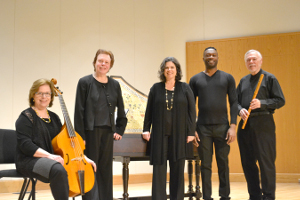For all the focus on traditional orchestra and opera repertoire every summer at Brevard Music Center, it is possible for band music to get lost or at least become obscured. At the conclusion of this year’s season, the 71st by the way, Kraig Williams uncorked his 53 student musicians with a dandy program of Ralph Vaughan Williams’ Overture to The Wasps; William Bolcom’s Concert Suite for Saxophone and Wind Ensemble with Joseph Lulloff as soloist, and three movements from James Barnes’ heroic and pathos-filled Third Symphony, Op. 98.
The RVW Wasps Overture started off this afternoon program with a certain amount of predictable buzzing. Otherwise the work was filled with heroic themes and sounds of grandeur. Clarinets occupied the conductor’s left position; there were nine plus a bass clarinet, and they handled the lion’s share of insect imitation. On the other side, where you’d normally find cellos, were the flutes including one piccolo.
Next came the very interesting piece by William Bolcom, the Concert Suite, with Lulloff playing alto saxophone. The work consists of four movements; “Lively,” “Like an Old Folksong,” “Scherzando,” and “Introduction and Jump,” each typical hands-on description of Bolcom’s voice. Perhaps most distinctive is the “Folksong” movement, for it does sound as though he reached into an old hymnal or southern reader for the theme. Lulloff handled each demanding part with great skill, ease of execution, and a comfort level on stage common to seasoned professionals. This is his ninth year as saxophone instructor at BMC. He is Professor of Music at Michigan State University.
After intermission we heard the centerpiece of this program. In 1996, James Barnes was commissioned under a no strings attached (Ha! Get it?) contract to make a new symphony work for symphonic band. He started work with an optimistic vision, but soon his daughter died, sending him, understandably, into a deep state of depression. He continued to compose, allowing all feelings to flow through his pen. Nearing completion, his son was born, giving new life to the creative curve. The result is a major work known as the Third Symphony, Op. 89. It is four movements, however due to time or difficulty, Conductor Williams, a clarinetist by training, elected to perform only three movements. The first was Lento, a dreamy polyphonic exercise. The second was titled “Mesto (Song for Natalie),” and it was easy to understand the motivation for this movement. There was a lovely solo cello line (the lone string instrument of the entire afternoon) that reached deeply etched feelings of longing and loss. The final Allegro giocoso included some highly-crafted counterpoint including a soft, legato chorale with support from below by rapid running figures in 16th notes. The work is clearly by a professional composer and would be at home on nearly any major ensemble concert.
Kraig Williams worked hard to keep all the elements together. He is a hands-on type conductor, aware of nearly every beat and nuance of the score. There were solid entrance cues and excellent response from the young musicians to his calls for expression. But he could not have predicted or accommodated the security alarm of a white Lexus parked adjacent to Whittington-Pfohl Auditorium. For unknown reasons, the alarm was activated, and its pitch was loud and of no timbre consistent with the band. It marred an otherwise fine listening experience.
Drenched from the workout in what is gearing up to be a record hot and humid August, Williams expressed satisfaction afterward with the entire program, and the young performers. One — percussionist Victoria Nelson, of Asheville, NC — arrived at camp in June with one hand in a cast — a broken wrist — yet she attended lessons, including timpani with Tim Adams, and healed well enough to perform on a wide range of percussion instruments throughout this program. Such is the depth of skill and passion of students and the ability of youth to heal.











